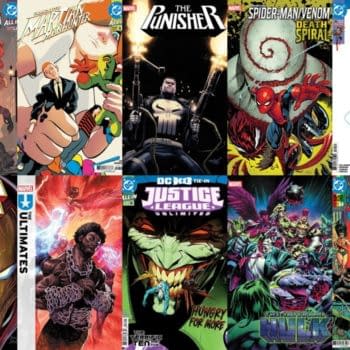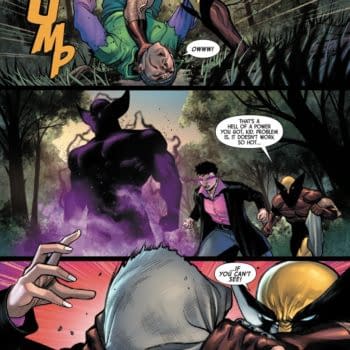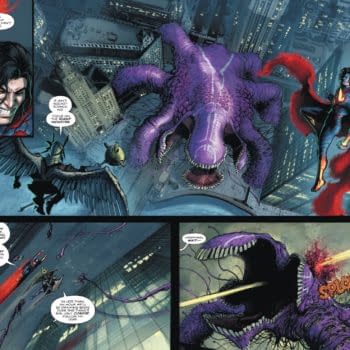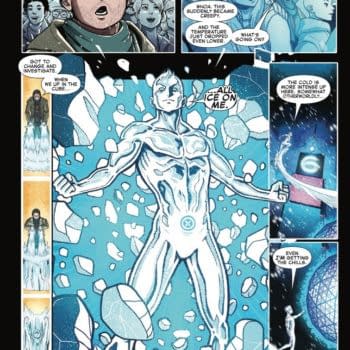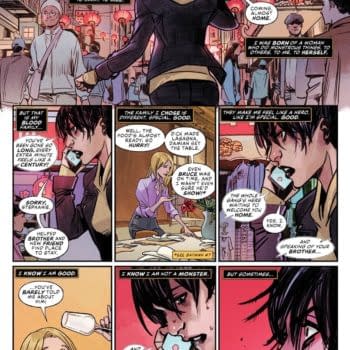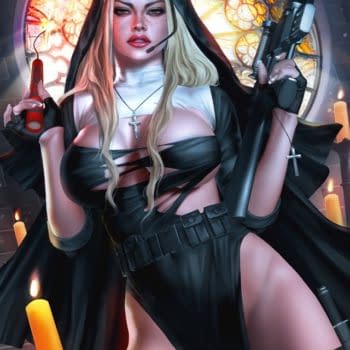Posted in: Comics | Tagged: brandon graham, Comics, entertainment, Farel Dalrymple, indie comcis, Liz Suburbia, Ron Wimberly, Small Press Expo
SPX '15: The 'Emotional Currency Of Comics' At The Royal Redux Panel With Brandon Graham, Liz Suburbia, Farel Dalrymple & Ron Wimberly
The Royalboiler Redux panel with Brandon Graham, Liz Suburbia, Farel Dalrymple, and Ron Wimberly, fell in the latter part of Sunday at Small Press Expo, but there was a line snaking through the lower hallways to enter the conference room.

Graham asked the panelists what their "idea of being a cartoonist" is and how it's changed perhaps now that they are "adults" and have to "look yourself in a mirror".
Wimberly spoke about the "myth" of cartooning and said that he first started to think about it as a "life choice" when he was in college. He realized that he needed a way to make money with his "skillset" so hoped to do so as a cartoonist, but now realizes a certain irony in that. He would have loved to have worked on video games, but it didn't occur to him then. He still perhaps wants to do that. Particularly if he could find games that appeal to him in the same ways that his comics subjects do. That type of work, based on his experience in animation, he knows to be a "huge endeavor" and often makes you out to be a "cog in a machine".
Graham asked Liz Suburbia if she went to college for art, and she said that yes, she went to art school, but she wasn't thinking of comics at the time. She still has a day job that she does comics around. She still doesn't know what's next, but she's hoping with the money from her current book to hopefully go back to school and be able to teach something in the future that can go along with her cartooning. She's very sensitive to the financial pressure of working on comics and feels it causes her work to suffer if she's relying on that, she said.
She said she's wanted to quit a lot when it comes to comics, but "keeping perspective" has helped. She doesn't feel like complaining about the fact that she can't pay her bills with comics, but if she can "squeeze" comics in, that's important.
Farel Dalrymple said he went to SVA, when asked about educational background. When he was a child, he knew he wanted to be a cartoonist, something that's been with him a long time. There was a point as an adult when he considered it practically and wasn't sure how he'd make a living. He transferred into SVA at age 23, having not been able to afford art school previously, but he got student loans and grants. He studied illustration as being more lucrative, but realized once he was doing it that he didn't want to pursue it, nor did he want to draw superheroes as a cartoonist. He knew he wouldn't be capable of a monthly book or working from someone's script, so he hoped illustration would "supplement his income" but he realized soon after that working in a coffee shop or something similar would be better than the conflict between the two tasks.
Wimberly has also been through some tough times. While staying on a friend's couch, he got jobs with Criterion and Nike, but it got him "off of a couch", at least. Working for big companies was an eye-opener for him.
Graham joked self-effacingly that he feels that he's made a name for himself somewhat through "being a dick" and posting rejection letters online and things.
Wimberly posted a critical comic about working at Marvel on The Nib, and Graham asked him about it. Wimberly said it wasn't his intention to make people feel bad for being surrounded by "institutional racism" but he did want people to know "exactly" how he felt about it. He actually enjoyed working with the people mentioned in the comic. But once published, the reaction to the comic had a big impact.
Wimberly told a story of a wedding he attended recently in New Orleans. He was asked to get out of the way if he wasn't making drinks, implying he was the help. He wasn't sure how to react, until he saw that the bride was reacting the same way as him and did hear it to be a racist statement. Afterwards, the guy came up and apologized, but that only further cemented the fact that it had been intentional.
Wimberly feels that Marvel are doing some things to move toward diversity, but he doesn't particularly want to be involved anymore.
Brandon apologized for adding to "shit talking" before telling a story, and Wimberly interjected, to agreeing laughter, "that's why you guys come here!"
Brandon told a story of submitting a portfolio, and being told by an editor, "If I was in my last job, I'd hire you, but we do better here at Marvel".
Wimberly was amazed at the "smugness" comic people can show in light of that story. "You realize we work in comics, right? It's not the Paris Review".
Wimberly feels that the movement in indie comics right now is to make sure that everyone is treating each other like human beings.

Wimberly said that before his Image deal, he was talking to Kelly Sue DeConnick that he might be willing to "try something else". Dalrymple agreed that there's a "banging your head against the wall feeling" about comics sometimes, doing the same thing again and again despite the problems of comics. It's an "addiction", he said, and carries a lot of depression and anxiety, which could perhaps fuel his work.
Graham said that he used to feel that comics were the "be all and end all" of his life, but marrying his wife Marian Churchland, who didn't care that much about comics, but was more interested in painting, challenged his perspective. He asked if the panelists if they really NEED to engage with some type of art, even if not comics.
Suburbia reads some prose fiction, but not much. She watches TV while drawing. Graham commented that the internet makes the cartoonist's life less depressing because you can type publically on the internet while working. Wimberly agreed with Graham's observation that it can be a kind of revelation that you can work away from the drawing desk and be around people like in a café because cartoonists spend so much time alone.
Graham and the panelists started getting rates into an "honest" conversation about page rates and questioning the appearance of art on products like totebags after receiving a rather low set page rate or cover rate for that art. Graham had very high hopes as a kid for comics, but his first job was 30 pages for 100 dollars. Now he's at a point that he's actually "surviving" and doesn't know what to do about it now. He's surprised to find people caring about his work now.
Wimberly commented that having people care about your work is very important. Comic is his "message in a bottle" reaching out to people. Sometimes he puts the message out and it "means something different" to that person than to him, he said. Sometimes it really surprises him.
Treating comics "like a dialogue and not like a commodity" is the way of the future, Suburbia said. She thinks in 50 years, there won't be a DC or a Marvel Comics. She takes comics back to cave painting, and needs to be something that's accessible. She recalls Dylan Horrocks' experience quitting Batgirl and the damage that working in the mainstream did for him.

Dalrymple said that the fan understanding of what it actually "takes to make a comic book" is often limited. There's answering e-mails, and many onerous tasks on top of the hard work.
Graham agreed that sometimes answering e-mails feels like his job and he has to remind himself that drawing is. Wimberly agreed. Dalrymple feels the need to write long, polite responses, but has started to ask himself what will happen if he doesn't make himself do it.
During Q & A, I asked if the panelists would still consider doing socially progressive experimental comics with the Big Two if they were asked. Even though many of them keep getting cancelled.
Ironically, Suburbia was recently approached and had to assess that situation for herself. In the end, she decided not to because she felt, as a friend mentioned, that the Big Two ought to meet comics creators half way rather than try to coopt them to trade on their "street cred".
Brandon Graham said that he had spoken with Kelly Sue DeConnick about the same issues, and both Graham and Suburbia said there are people who have the energy and the mindset to take these project on to try to "change things from the inside" but you need to know yourself as a creator and whether that's appropriate to you, with all the difficulties it entails.
Wimberly said he'll do the work that comes in terms of ad work, maybe do his own comics, but I the end it's a job, but he agrees you shouldn't sacrifice your identity, like a commodity, to big comics companies. Wimberly worries about that himself, and it concerns him. Suburbia said you have to "be aware of what's going on" otherwise "they'll just use you".
Dalrymple said that some times books tank on these kind of experimental projects at Marvel that do have "street cred", in the instance he was talking about meaning the writer involved, with only a little help for promoting the comic.
Wimberly said, "They give you a going rate for your soul".
An audience member observed that going to comic shows, fans often have no idea what life is like for cartoonists, and asked for an example for a "day in the life of an artist". Dalrymple said that many people are not that systemized, but Craig Thompson does, working at 150 pages a year. Suburbia has more of a schedule around her day job. She works from 12 to 8:30 most days at her job, so spends the morning working on her books. She has developed an "economy of style" that's necessary. Then she comes home, eats, and goes to bed. Graham sometimes longs for the schedule of a day job, like when working at the Strand in New York. Now he wakes up an has months to try to plan out. He now notices that he's in his underwear half way through the day. Wimberly likes to put on pants for important phone calls. Graham wears a shirt for Skype.
Asked about the role of editors, Graham said that it's interesting now that he's editing other people, and he feels it's important to have a conversation and communicate with people about their own work. With Island, he has to put people who he trusts in the anthology and basically says "do what you want to do". He thinks of them as competent artists and adults. There's freedom for him in knowing that. It's very nice to know that the "lines on the paper are going to print", but it's also like the Emperor's New Clothes since no one is going to tell you that you're about to step outside naked until you do. It's an exposing thing.
The creators were asked how often they run into a situation where something they've tried to say has been dramatically misinterpreted. Graham said that in working on Prophet, people sometimes find it confusing. For awhile he and his friend Simon tried to be "super clear" and that was a form of "compromise". He thinks a lot about "active artwork" and "passive artwork". The first gives you all you need for interpretation and the second makes you think afterward.
Dalrymple feels his work is more of a monolog, since he doesn't think he's good at speaking to the public. He's never really been edited, since though he's worked with editors, he's rarely asked to change things. He likes approval for his work, but he also likes movies and TV shows because of how they make him feel, and that's what he's trying to convey in his work. He thinks the right sort of people will respond that "honesty" and "truth".
Graham called this "emotional currency" and it's accepted in some places and not others. He doesn't feel that all comics have to be universal, but if you find something that matches, it's important.
So is there any romance left in the role of the comic artist, or in the creation of comics for these panelists? Wimberly laughed and didn't want to answer. Dalrymple gave quite a detailed response about the ways in which the word "romantic" for him means ideal, and creating comics is still an ideal for him since it's his "salvation". Neil Gaiman's speech in Philadelphia last year, according to Dalrymple, inspired him, where he said that if you lose your job or break up with your partner, you continue and you "make the art". That is something he tells himself, and though it may sound romantic, it works for him. Suburbia said, in response to creators, that she feels that it's up to creators to make the suffering mean something, or the human experience sweeter. Wimberly circled around to comment that, for him, romance is being able to look at the mundane and make it into something more, whether positive or negative. He thinks that "sometimes in art there's an element of being able to romanticize the mundane. To take elements that might be overlooked and put them in a new context".
The panel was actually so capable of carrying on its own discussion that it ran a fair bit longer than an hour but showed no real signs of fading out.










